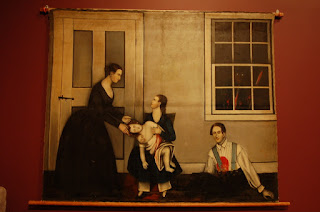THE WICKEDNESS OF MODERNITY
“I fell upon my knees, and prayed to God to have mercy on me for Christ’s sake. But I only grew more miserable. The load of my sins was heavier and heavier. All that I had ever done came plain and open in my sight, and I was led to see that I must perish. There was no help for me. All my sins was upon my own head” -Jack Hodges, Black Jacob, a Monument of Grace by Rev. Ansel Eddy
From what I can piece together Andrew Osterhout’s father, like his son (my grandfather) was a butcher in Orange County. Jacob Osterhout made the local paper in the late 1800’s, after his horse got loose outside his butcher shop and ran wild down North Main street in Middletown, New York. No one was hurt.
His son, great grandfather Andrew Osterhout also got some minor press a couple of times in his life. In 1915, after finding a World War I doughboy’s kit and uniform that had fallen off the passing troop train into the weeds, the local paper ran a “human interest,” story of great grandad’s patriotic find. He found the odd army treasure while mowing Crabtree’s hay fields, down by the tracks in Montgomery. It was a slow news week.
Ten years later Andrew Osterhout was mentioned once again in the Middletown Record as a hapless victim under the headline Epidemic of Accidents, in Montgomery. It’s not what you think. After an ice storm hit town, great grandpa Andrew slipped on the slick floor and cracked his head in Crabtree’s barn—while carrying a bucket of milk. He was part of that “epidemic” of falls, caused by the ice storm, that resulted in cracked heads and spilled milk all across the county. No tears were shed.
After his wedding, William Henry Seward joined Auburn’s Episcopal Church and moved into Judge Elijah Miller’s house with his extended, well-respected family. He and Frances Miller had kids, while Henry considered a career in state politics. The well-to-do Sewards and Millers knew nothing of the Reeds, Freemans, or for that matter, the notorious Jack Hodges— who was now locked up down the road. They might as well have lived on separate planets.
Right after Hodges was transferred to Auburn, the beaten down, arthritic David Conklin was also moved up river, to Mt. Pleasant Prison (Sing-Sing) to mine marble deposits, until he was pardoned from his life sentence in 1834. Here we will cast aside David Conklin, leaving him to serve out the rest of his time chipping away in the Sing-Sing marble mines. Listed on prison records as an “invalid,” when released, we will ignore him, as the world ignored his victim. Of all these characters I consider Conklin the least likable and most culpable. He should’ve hung alongside James Teed—not David Dunning. He has no excuses for his crimes. There’s no question in my mind that Conklin was the primary instigator in the conspiracy to murder Dick Jennings, before, during, and after the fact. I completely agree with Nathaniel Knapp in his letter to his in-laws in Andes. Why the hell did Conklin deserve a pardon and not the lesser accessory, cousin James Teed, or the poor woodcutter Dunning? No more consideration will be accorded, nor attention paid, to Hannah’s brother David Conklin. He will be shunned as the Jennings and Seward family shunned Hannah and her children.
In the spring of 1825, six years into his twenty-one year sentence, Jack Hodges was taken in irons from the soon to be smoldering ruins of Newgate; put on the steam-driven ferry, and transported, one last time, back through Haverstraw. There he was remanded to a horse drawn, heavily armored black mariah, for the long journey up the stage road, through Goshen, to Auburn. As soon as the gate swung back and Greenwich Village was revealed, Jack was shocked by the bright bustle of normalcy and its long forgotten appeal. The world that laid just beyond the stone walls, the world he’d spent all this time convincing himself didn’t exist anymore, stared him right in the face. Times had changed.
And time had also changed Jack. The cat, the Sunday Cell, the debasement and hopelessness of those around him, had combined to bring a sad declination in the once cheerful sailor. He was tired and still haunted by Dick Jennings’ murder. And Jack’s battlefield would change once again. Years later Hodges admitted to his despondency upon leaving Newgate and persistent cloud of the Jennings affair. He’d willingly confess to Auburn chaplain, Rev. Louis Dwight, of his loss of faith and inability to compartmentalize his role in all these conspiracies lined up against him. And he was more than willing to talk and existentially change, with the help of this new chaplaincy.
In five short years, Jack would completely transform into the state’s version of a penitent man. Considered a model prisoner and not in any way disturbed or damaged by his experiences within Newgate, or within the Auburn System, Hodges stood out as an example. “Looking back upon my past life,” Jack confessed to the Auburn chaplain,”and feeling my hell-desert; deserving nothing but the bottomless pit; and this brings me to feel that nothing but the grace of God has kept me to this day.” I’d say the Jennings and Sewards also had something to do with getting Jack to his day of transmutation. Jack Hodges always seemed to be at the center of things, the topic of conversation.

Comments
Post a Comment